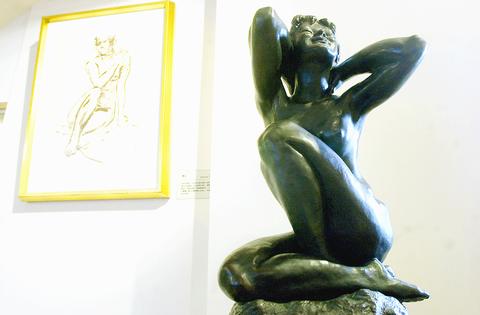Yuyu Yang (
Yang was born in Taiwan and received his education in Japan and Beijing. In Japan, Yang studied under Asakura Fumio (

PHOTO: CHEN CHENG-CHANG, TAIPEI TIMES
In The Dance of Fire (1954), Yang models the figure after the Chinese mythological character of Nu Wa Bu Tian (
Yang's work took him around the world, including to Rome, where he worked and exhibited for three years until 1966. On view in the current show are prints based on sketches he made of the streets of Rome, with that city's picturesque cafes, markets and churches.
Yang's styles changed radically during the different stages of his career. In the 1970s he turned to more streamlined, abstract compositions, two examples of which include Flight (1971) at Singapore's Mandarin Hotel and Wall Street's stainless-steel piece East West Gate (1973). This exhibition, however, emphasizes Yang's earlier, traditional works that laid the foundations for his prolific and ground-breaking career.
Art Notes
What: Naked Women and Streets of Rome: Sculptures and Prints from 1950's and 1960's (楊英風人體雕塑版畫展)
Where: Yuyu Yagn Museum (楊英風美術館), 31 Chungking S. Rd., Sec. 2, Taipei (台北市重慶南路二段31號)
When: Until Aug. 26 (Closed Monday)

Three big changes have transformed the landscape of Taiwan’s local patronage factions: Increasing Democratic Progressive Party (DPP) involvement, rising new factions and the Chinese Nationalist Party’s (KMT) significantly weakened control. GREEN FACTIONS It is said that “south of the Zhuoshui River (濁水溪), there is no blue-green divide,” meaning that from Yunlin County south there is no difference between KMT and DPP politicians. This is not always true, but there is more than a grain of truth to it. Traditionally, DPP factions are viewed as national entities, with their primary function to secure plum positions in the party and government. This is not unusual

More than 75 years after the publication of Nineteen Eighty-Four, the Orwellian phrase “Big Brother is watching you” has become so familiar to most of the Taiwanese public that even those who haven’t read the novel recognize it. That phrase has now been given a new look by amateur translator Tsiu Ing-sing (周盈成), who recently completed the first full Taiwanese translation of George Orwell’s dystopian classic. Tsiu — who completed the nearly 160,000-word project in his spare time over four years — said his goal was to “prove it possible” that foreign literature could be rendered in Taiwanese. The translation is part of

The other day, a friend decided to playfully name our individual roles within the group: planner, emotional support, and so on. I was the fault-finder — or, as she put it, “the grumpy teenager” — who points out problems, but doesn’t suggest alternatives. She was only kidding around, but she struck at an insecurity I have: that I’m unacceptably, intolerably negative. My first instinct is to stress-test ideas for potential flaws. This critical tendency serves me well professionally, and feels true to who I am. If I don’t enjoy a film, for example, I don’t swallow my opinion. But I sometimes worry

Mongolian influencer Anudari Daarya looks effortlessly glamorous and carefree in her social media posts — but the classically trained pianist’s road to acceptance as a transgender artist has been anything but easy. She is one of a growing number of Mongolian LGBTQ youth challenging stereotypes and fighting for acceptance through media representation in the socially conservative country. LGBTQ Mongolians often hide their identities from their employers and colleagues for fear of discrimination, with a survey by the non-profit LGBT Centre Mongolia showing that only 20 percent of people felt comfortable coming out at work. Daarya, 25, said she has faced discrimination since she